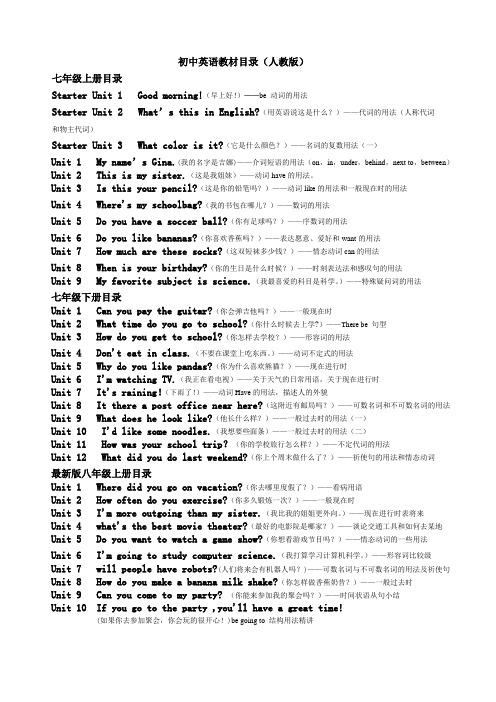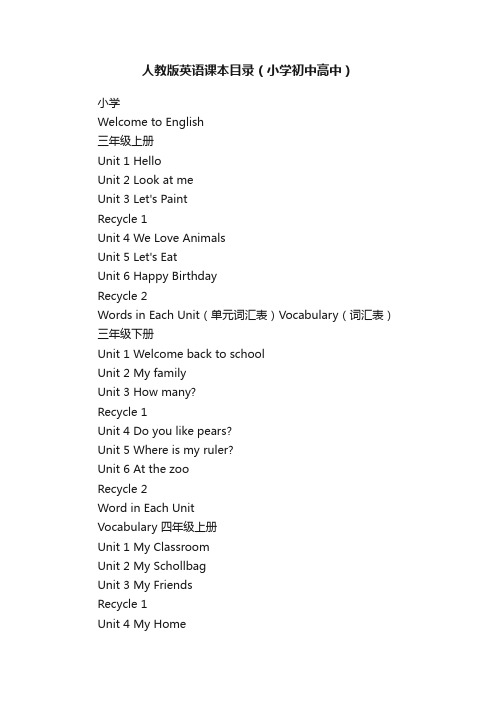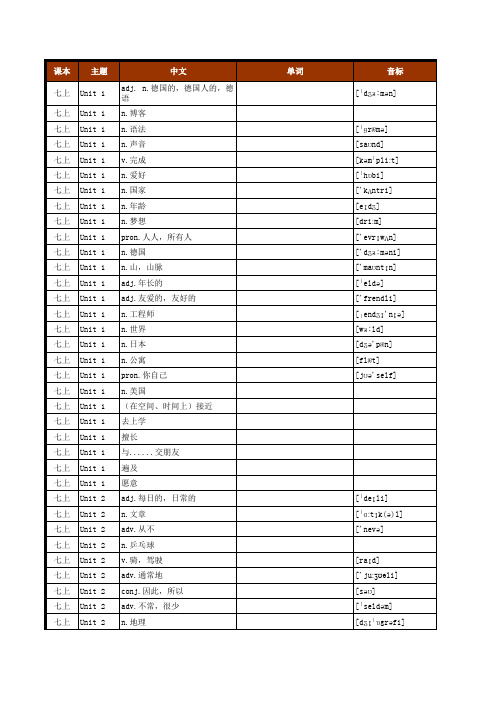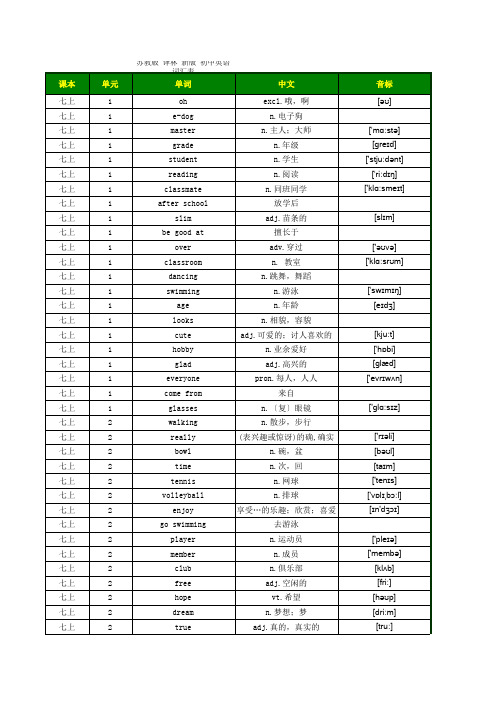初中英语课本版全6册
初中英语教材目录人教版

初中英语教材目录(人教版)七年级上册目录Starter Unit 1 Good morning!(早上好!)──be 动词的用法Starter Unit 2 What’s this in English?(用英语说这是什么?)——代词的用法(人称代词和物主代词)Starter Unit 3 What color is it?(它是什么颜色?)——名词的复数用法(一)Unit 1 My name’s Gina.(我的名字是吉娜)——介词短语的用法(on,in,under,behind,next to,between)Unit 2 This is my sister.(这是我姐妹)——动词have的用法。
Unit 3 Is this your pencil?(这是你的铅笔吗?)——动词like的用法和一般现在时的用法Unit 4 Where's my schoolbag?(我的书包在哪儿?)——数词的用法Unit 5 Do you have a soccer ball?(你有足球吗?)——序数词的用法Unit 6 Do you like bananas?(你喜欢香蕉吗?)——表达愿意、爱好和want的用法Unit 7 How much are these socks?(这双短袜多少钱?)——情态动词can的用法Unit 8 When is your birthday?(你的生日是什么时候?)——时刻表达法和感叹句的用法Unit 9 My favorite subject is science.(我最喜爱的科目是科学。
)——特殊疑问词的用法七年级下册目录Unit 1 Can you pay the guitar?(你会弹吉他吗?)——一般现在时Unit 2 What time do you go to school?(你什么时候去上学?)——There be 句型Unit 3 How do you get to school?(你怎样去学校?)——形容词的用法Unit 4 Don't eat in class.(不要在课堂上吃东西。
人教版英语课本目录(小学初中高中)

人教版英语课本目录(小学初中高中)小学Welcome to English三年级上册Unit 1 HelloUnit 2 Look at meUnit 3 Let's PaintRecycle 1Unit 4 We Love AnimalsUnit 5 Let's EatUnit 6 Happy BirthdayRecycle 2Words in Each Unit(单元词汇表)Vocabulary(词汇表)三年级下册Unit 1 Welcome back to schoolUnit 2 My familyUnit 3 How many?Recycle 1Unit 4 Do you like pears?Unit 5 Where is my ruler?Unit 6 At the zooRecycle 2Word in Each UnitVocabulary 四年级上册Unit 1 My ClassroomUnit 2 My SchollbagUnit 3 My FriendsRecycle 1Unit 4 My HomeUnit 6 Meet My Family!Recycle 2Words in Each Unit(单元词汇表)Vocabulary(词汇表)四年级下册Unit 1 Our SchoolUnit 2 What Time Is It?Unit 3 Is This Your Skirt?Recycle 1Unit 4 It’s Warm TodayUnit 5 How Much Is It?Unit 6 At a FarmRecycle 2Words in Each UnitVocabulary五年级上册Unit 1 My New TeachersUnit 2 My Days of the WeekUnit 3 What's Your Favourite Food?Recycle 1Unit 4 What Can You Do?Unit 5 My New RoomUnit 6 In a Nature ParkRecycle 2Words in Each Unit(单元词汇表)Vocabulary(词汇表)五年级下册Unit 1 This Is My DayUnit 2 My Favourite SeasonUnit 3 My BirthdayRecycle 1Unit 5 Look at the MonkeysUnit 6 A Field TripRecycle 2Words in Each UnitVocabulary六年级上册Unit 1 How Do You Go There?Unit 2 Where Is the Science Museum? Unit 3 What Are You Going to Do? Recycle 1Unit 4 I Have a Pen PalUnit 5 What Does She Do?Unit 6 The Story of RainRecycle 2Words in Each UnitVocabulary六年级下册Unit 1 How Tall Are You?Uni t 2 What’s the Matter, Mike?Unit 3 Last WeekendUnit 4 My HolidayRecycle 1 Let’s Take a Trip!Recycle 2 A Farewell PartyWords in Each Unit(单元词汇表)Vocabulary(词汇表)初中七年级上册预备篇Starter Unit 1 Good morning! Starter Unit 2 What’s this in E nglish? Starter Unit 3 What color is it?Unit 1 My name’s Gina.Unit 3 This is my sister.Unit 4 Where’s my backpack?Unit 5 Do you have a soccer ball?Unit 6 Do you like bananas?Unit 7 How much are these pants? Unit 8 When is your birthday?Unit 9 Do you want to go to a movie? Unit 10 Can you play the guitar?Unit 11 What time do you go to school? Unit 12 My favorite subject is science. Words and Expressions in Each Unit 七年级下册Unit 1 Where’s your pen pal fro m? Unit 2 Where’s the post office?Unit 3 Why do you like koalas?Unit 4 I want to be an actor.Unit 5 I’m watching TV.Unit 6 It’s raining!Unit 7 What does he look like?Unit 8 I ’d like some noodles.Unit 9 How was your weekend?Unit 10 Where did you go on vacation? Unit 11 What do you think of game shows? Unit 12 Don’t eat in class.Words and Expressions in Each Unit八年级上册Unit 1 How often do you exercise?Unit 2 What’s the matter?Unit 3 What are you doing for vacation? Unit 4 How do you get to school?Unit 5 Can you come to my party?Unit 6 I’m more outgoing than my sisiter. Unit 8 How was your school trip?Unit 10 I’m going to be a basketball player. Unit 11 Could you please clean your room? Unit 12 What’s the best radio station? Words and Expressions in Each Unit八年级下册Unit 1 Will people have robots?Unit 2 What should I do?Unit 3 What were you doing when the UFO arrived?Unit 4 He said I was hard-working.Unit 5 If you go to the party, you’ll have a great time!Unit 6 How long have you been collecting shells?Unit 7 Would you mind turning down the music?Unit 8 Why don’t you get her a scarf?Unit 9 Have you ever been to an amusement park?Unit 10 It’s a nice day, isn’t it?Words and Expressions in Each Unit九年级全一册Unit 1 How do you study for a test?Unit 2 I used to be afraid of the dark.Unit 3 Teenagers should be allowed to choose their own clothes.Unit 4 What would you do?Unit 5 It must belong to Carla.Unit 6 I like music that I can dance to.Unit 7 Where would you like to visit?Unit 8 I’ll help clean up the city parks.Unit 9 When was it invented? Unit 10 By the time I got outside, the bus had already left.Unit 11 Could you please tell me where the restrooms are?Unit 12 You’re supposed to shake hands.Unit 13 Rainy days make me sad.Unit 14 Have you packed yet?Unit 15 We’re trying to save the manatees! Words and Expressions in Each Unit高中必修一Unit 1 FriendshipUnit 2 English around the worldUnit 3 Travel journalUnit 4 EarthquakesUnit 5 Nelson Mandela - a modern hero必修二Unit 1 Cultural relicsUnit 2 The Olympic GamesUnit 3 ComputersUnit 4 Wildlife protectionUnit 5 MusicWorkbookUnit 1 Cultural relicsUnit 2 The Olympic GamesUnit 3 ComputersUnit 4 Wildlife protectionUnit 5 MusicAppendices附录Notes to the texts课文注释Grammar语法Words and expressions in each unit各单元生词和习惯用语Vocabulary词汇表Irregular verbs不规则动词Changes in international phonetic symbols for English英语国际音标变化表必修三Unit 1 Festivals around the worldUnit 2 Healthy eatingUnit 3 The Million Pound Bank NoteUnit 4 Astronomy:the science of the stars Unit 5 Canada—"The True North" WorkbookUnit 1 Festivals around the worldUnit 2 Healthy eatingUnit 3 The Million Pound Bank NoteUnit 4 Astronomy: the science of the stars Unit 5 Canada—"The True North" Appendices附录Notes to the texts课文注释Grammar语法Words and expressions in each unit各单元生词和习惯用语Vocabulary总词表Irregular verbs不规则动词Changes in international phonetic symbols for English英语国际音标变化表必修四Unit 1 Women of achievementUnit 2 Working the landUnit 3 A taste of English humourUnit 4 Body languageUnit 5 Theme parks必修五Unit 1 Great scientistsUnit 2 The United KingdomUnit 3 Life in the futureUnit 4 Making the newsUnit 5 First aid WorkbookUnit 1 Great scientistsUnit 2 The United KingdomUnit 3 Life in the futureUnit 4 Making the newsUnit 5 First aidAppendices附录Notes to the textGrammarWord and expressions in each unit VocabularyIrregular vebsChanges in international phonetic symbols for English后记必修六Unit 1 ArtUnit 2 PoemsUnit 3 A healthy lifeUnit 4 Global warmingUnit 5 The power of natureWorkbook Unit 1 ArtWorkbook Unit 2 PoemsWorkbook Unit 3 A healthy life Workbook Unit 4 Global warming Workbook Unit 5 The power of nature Appendices Notes to the texts Appendices GrammarAppendices Words and expressions in each unitAppendices VocabularyIrregular VerbsChanges in international phonetic symbols for English后记必修七Unit 1 Living wellUnit 2 RobotsUnit 3 Under the seaUnit 4 SharingUnit 5 Travelling abroadWorkbookUnit 1 Living wellUnit 2 RobotsUnit 3 Under the seaUnie 4 SharingUnit 5 Travlling abroadAppendices附录Botes to the textGrammarWord and expressions in each unit Vocabulary Irregular verbsChanges in international phonetic symbols for English 后记必修八Unit 1 A land of diversityUnit 2 CloningUnit 2 Inventors and inventionsUnit 4 PygmalionUnit 5 Meeting your ancestorsWorkbookUnit 1 Aland of diversityUnit 2 CloningUnit 3 Inventors and inventionsUnit 4 PygmalionUnit 5 Meeting your ancestors Appendices附录Notes to the textGrammarWords and expressions in each unit VocabularyIrregular verbsChanges in international phonetic symbols for English 后记必修九unit1Breaking recordsunit2Sailing the oceansunit3Australia unit4Exploring plantsunit5Inside advertising必修十Unit1Nothing ventured,nothing gained Unit2King LearUnit3Fairness for allUnit4Learning efficientlyUnit5Enjoying novelsAppendices附录必修十一Unit1New ZealandUnit2Detective storiesUnit3Finding the correct perspective Unit4Legends of ancient GreeceUnit5Launching your career Appendices附录。
苏教版-译林-新版-初中英语词汇表-带音标(七年级至九年级全6册)默写版本(完美)

bowl time tennis volleyball
enjoy
go swimming player member club free hope dream true
come true drawing weekend
at/on weekends of course shop
table tennis else lot
['pʌmpkɪn]
七上 5
lantern
[ˈlæntən]
七上 5
inside
[ˌɪn'saɪd]
七上 5
knock
[nɒk]
七上 5 knock on the door
七上 5
shout
[ʃaʊt]
七上 5 trick or treat
七上 5
if
[ɪf]
七上 5
treat
[triːt]
七上 5
七上 2
七上 2
单词 oh
e-dog master grade student reading classmate after school
slim be good at
over classroom
dancing swimming
age looks
cute
hobby glad everyone come from glasses walking
[wɔːl]
七上 3
phone
[fəʊn]
七上 3 七上 3 七上 3 七上 3 七上 3
on the phone from ... To ...
take get up go to school
[teɪk] ['getʌp]
初中英语课本第6册(1984年版)

初中英语课本第6册(1984年版)初中英语课本第六册LESSON 1DRILLS(句型练习)1(1) Many people speak English.English is spoken by many people.(2) We often use a recorder in our English class.A recorder is often used in our English class.(3) They show slides once a week in their class.Slides are shown once a week in their class.(4) They publish English textbooks in that publishing house.English textbooks are published in that publishing house.2A: Is thismade in Guangzhou?ofB: No, it isn’t.A: Where is it made?B: I t’s made in Shanghai.DIALOGUE(对话)ENGLISH IS WIDELY USEDPing: Dad, I got a “C” in English again. I tried my best.Dad: Well, don’t give up. English may be hard, but it’s so useful.Ping: How widely is English used?Dad: Very widely. English is one of the working languages at international meetings. It’s probably the most widely used at those meetings. And do you know most international business letters are written in English? Ping: Really? Is English understood by people outside England and the United States?Dad: Yes. I spoke English when I was in Japan. Many people understood me. Ping: How about other countries?Dad: Well, I know that in Sweden and France a lot of people understand English.Ping: Is English the language spoken by the largest number of people in the world?Dad: No.Ping: Then Chinese must have the largest number of speakers.Dad: Right. But Chinese is spoken by few people outside China.Ping: Dad, did people in China study English a long time ago?Dad: Not so very long ago. In China the first English textbooks were publishedin the late nineteenth century.Ping: Did many people in China study English at that time?Dad: No, not many. But by and by, more and more people began to study English. Later, English was required for study in many schools.Ping: It’s required in our school now. But, Dad, English is so hard!Dad: It is hard, but when you’ve learned it, you’ll find it a bridge to so much knowledge. And you’ll find you can enjoy so many more books, if you know English.Ping: Well, I’ll try harder.GRAMMAR(语法)被动语态(The Passive Voice) (Ⅰ)1、主动语态和被动语态英语动词有两种语态,即主动语态(The Active Voice)和被动语态(The Passive Voice)。
初中英语仁爱版单词表(按单元顺序)(七至九年级全6册)

Unit 1 Topic 1
afternoon
n。下午
[’ɑːftə’nuːn]
七上
Unit 1 Topic 1
goodbye
interj.再见
[ˌgʊd'baɪ]
七上
Unit 1 Topic 1
bye
interj.再见
[baɪ]
七上
Unit 1 Topic 1
fine
adj。健康的;晴朗的
[faɪn]
interj。喂,你好
[hə’ləʊ]
七上
Unit 1 Topic 1
are
v。是
[ɑː]
七上
Unit 1 Topic 1
yes
inrerj。是;同意
[jes]
七上
Unit 1 Topic 1
no
interj.不;不是;没有det.没有,无
[nəʊ]
七上
Unit 1 Topic 1
not
adv。不;没有
Unit 1 Topic 2
three
num.三
[θriː]
七上
Unit 1 Topic 2
four
num。四
[fɔː]
七上
Unit 1 Topic 2
five
num.五
[faɪv]
七上
Unit 1 Topic 2
six
num.六
[sɪks]
七上
Unit 1 Topic 2
seven
num。七
['sevn]
hi
interj。喂
[haɪ]
七上
Unit 1 Topic 1
thanks
初中英语沪教版单词表(带音标)(七年级至九年级全6册)

遥控器 (在词典或参考书)查阅,查 检 adj.与众不同的,不寻常的 n.& v.采访 n.模型 n.邮票 n.门铃 adj.前面的 adj.银色的,银白色的 v.按,揿,摁 adv.不久 n.孙子,外孙 n.孙女,外孙女 n.报纸 prep.向里面 adv.处处,到处,各个地方 v.跟随 adv.几乎不,几乎没有 n.空间 adj.空闲的 modal v.应该 n.句子 n.杂志 pron.某事,某物 adv.确实,的确 pron.任何东西,任何事物 adv.以前 n英国 adv.以上,大于,多于 客厅,起居室 对...有害 对...感兴趣 (绘画、雕塑等)艺术作品 n.人 adj.快乐的,高兴的 adj.工作努力的,勤勉的 adj.耐心的
[ˈeɪʃə] [gaɪd] [ˈeərɪə] [trə'dɪʃənəl] [ˈmɒd(ə)n] [ˈsaɪtsiːɪŋ] [ˈsentə] [ˈfaʊntɪn] ['bɪldɪŋ] [dʒʌst] [ə'krɔːs] [laɪt]
七上 Unit 6 七上 Unit 6 七上 Unit 6 七上 Unit 6 七上 Unit 6 七上 Unit 6 七上 Unit 6 七上 Unit 6 七上 Unit 6 七上 Unit 6 七上 Unit 6 七上 Unit 6 七上 Unit 6 七上 Unit 6 七上 Unit 7 七上 Unit 7 七上 Unit 7 七上 Unit 7 七上 Unit 7 七上 Unit 7 七上 Unit 7 七上 Unit 7 七上 Unit 7 七上 Unit 7 七上 Unit 7 七上 Unit 7 七上 Unit 7 七上 Unit 7 七上 Unit 7 七上 Unit 7 七上 Unit 7 七上 Unit 7 七上 Unit 7 七上 Unit 7 七上 Unit 7 七上 Unit 7 七上 Unit 7
初中英语课本第6册(1984年版).docx

初中英语课本第 6 册(1984 年版)初中英语课本第六册LESSON 1DRILLS (句型练习)1(1)Many people speak English.English is spoken by many people.(2)We often use a recorder in our English class.A recorder is often used in our English class.(3)They show slides once a week in their class.Slides are shown once a week in their class.(4)They publish English textbooks in that publishing house.English textbooks are published in that publishing house.2A: Is this kind telephone made in Guangzhou?of bicycleTV setrecorderB: No, it isn ’t.A:Where is it made?B:I t ’smade in Shanghai.DIALOGUE (对话)ENGLISH IS WIDELY USEDPing:Dad, I got a “C”in English again. I tried my best.Dad:Well, don ’tgive up. English may be hard, but it’s so useful.Ping: How widely is English used?Dad:Very widely. English is one of the working languages at international meetings. It ’s probably the most widely used at those meetings. And do you know most international business letters are written in English?Ping:Really? Is English understood by people outside England and the United States?Dad: Yes. I spoke English when I was in Japan. Many people understood me. Ping: How about other countries?Dad: Well, I know that in Sweden and France a lot of people understand English.Ping:Is English the language spoken by the largest number of people in the world?Dad:No.Ping: Then Chinese must have the largest number of speakers.Dad: Right. But Chinese is spoken by few people outside China.Ping:Dad, did people in China study English a long time ago?Dad:Not so very long ago. In China the first English textbooks were publishedin the late nineteenth century.Ping: Did many people in China study English at that time?Dad: No, not many. But by and by, more and more people began to study English. Later, English was required for study in many schools.Ping: It ’s required in our school now. But, Dad, English is so hard!Dad: It is hard, but when you’ve learned it, you’ll find it a bridge to so much knowledge. And you’ll find you can enjoy so many more books, if youknow English.Ping: Well, I ’lltry harder.GRAMMAR (法)被(The Passive Voice) (Ⅰ)1、主和被英有两种,即主(The Active Voice )和被(The Passive Voice)。
苏教版 译林 新版 初中英语词汇表 带音标(七年级至九年级全6册)

向...借...七上3源自lettern.信,函
['letə]
七上
3
few
不多(的),少数(的)
[fjuː]
七上
3
a few
一些,少量
七上
3
away
adv.离开,远离
[ə'weɪ]
七上
3
far away from
远离
七上
3
on foot
走路,步行
七上
3
best
(well的最高级)最,最好地
[best]
七上
点钟 adv.好,对;不错
n.大门 conj.因此,所以 vt. 引,带,领 adv.到处,向各处
领某人参观 n.前面 在…前面
n.建筑物,房子,楼房 n.地,地面
<英>底层,一楼 adj.明亮的
adj.现代的;新式的 n.礼堂,大厅 n.日记
[ˌkʌm'truː] [ˈdrɔːɪŋ] ['wiːk'end]
[ɒv//kɔːs] [ʃɒp]
[els] [lɒt]
[fʌn] [tiːm]
[mætʃ] [ˈhɪərəʊ] [hwɪtʃ]
[best] [səʊ] [baɪˈɒlədʒi] [dʒɪˈɒgrəfi] ['hɪstəri] [deɪt] ['miːtɪŋ] [əˈklɒk] [əʊˈkeɪ] [geɪt] [səʊ] [ʃəʊ] [ə'raʊnd]
n.碗,盆 n.次,回 n.网球 n.排球 享受…的乐趣;欣赏;喜爱
去游泳 n.运动员 n.成员 n.俱乐部 adj.空闲的 vt.希望 n.梦想;梦 adj.真的,真实的
- 1、下载文档前请自行甄别文档内容的完整性,平台不提供额外的编辑、内容补充、找答案等附加服务。
- 2、"仅部分预览"的文档,不可在线预览部分如存在完整性等问题,可反馈申请退款(可完整预览的文档不适用该条件!)。
- 3、如文档侵犯您的权益,请联系客服反馈,我们会尽快为您处理(人工客服工作时间:9:00-18:30)。
初中英语课本第一册LESSON 1Letters: A B C D E F G W ords: face, bag, bee, bedLESSON 2Letters: H I J K L M N W ords: bike, chick, cake, hand LESSON 3Letters: O P Q R S T W ords: rose, dog, jeep, pen, knife, ship LESSON 4Letters: U V W X Y ZW ords: student, bus, plane, apple, sheep, egg, coat, orange LESSON 6DRILLS (句型练习)AThis is a book. That ’This is a pen. That ’s a chair.BWhat ’s this? It ’ a cake.What ’s that? It ’s an egg. What ’s that? It ’s an orange. LESSON 7DRILLS (句型练习)AWhat ’s this? It ’s a bus. It ’s a red bus.What ’s that? It ’s a car. It ’s a blue car.BIs this a jeep? Y es, it is. Is it green? Y es, it is.CIs this a ship? Y es, it is. What colour is it? It ’s yellow. Is that a plane? Yes, it is. What colour is it? It ’s white. DIALOGUE (对话)A :What colour is this apple?B :It ’s red.A :What colour is that banana?B :It ’s yellow.A :What colour is an orange?B :Why , it’s orange. An orange is orange LESSON 8DRILLS (句型练习)AThis is my cup.It isn’t your cup.My cup is white.Y our cup is yellow.That isn’t his bike. It ’Her bike is green.Is this your desk?Yes, it is. Is that your chair?No, it isn’t. It ’s his chair. Is this your rubber? Y es, it is. Is that your ruler? No, it isn’t. It ’s her ruler.DIALOGUE (对话)Tom :Kate!Kate :Y es?Tom :Is this your knife?Kate :No, it isn’t.* * *Kate :Tom! Is this your pencil-box?Tom :Y es, it is. Thank you.Kate :That ’s all right.LESSON 9DRILLS (句型练习)Aone ship; two ships; three cakes; four coats; five beds;six bees; seven bananas; eight oranges; nine buses; ten boxes;BThese are apples. Those aren’t apples. They ’re oranges. The apples are here.These are desks. The desks are here. The tables are there. DIALOGUE (对话)A :Look ,what ’s this?B :It ’s a ship.A :No ,it ’s a sheep. These are all sheep. They’re white sheep. What are those?B :Why , they’re sheep, too. They ’re black sheep.A :No, they aren’t sheep. They ’re goats.GRAMMAR (语法)名词的复数形式(The Plural Number of Nouns)(Ⅰ)1、一般在单数名词末尾加-s :book-----books ruler-----rulers egg-----eggs student-----students hand-----hands rose-----roses orange-----oranges2、以s 、x 等结尾的词加-es :bus-----buses box-----boxes注:knife 的复数形式为knives ,sheep 的复数形式和单数形式相同。
LESSON 10DRILLS (句型练习)AWhat are these? They ’re pigs. They ’re fat.What are those? They ’re goats. They ’re thin.BAre these horses white? Yes, they are.Are those cows white,too? No, they aren’t. They ’re black and white.CAre those chicks? No, they aren’t. Are they cocks? No, they aren’t. What are they, then? They ’re hens. They are big, fat hens.DIALOGUE (对话)Kate :What ’s in that box, Mum?Mum :Kate :New shoes for me! Mum :Guess.Kate :Are they white?Mum :No, they aren’t.Kate :Are they red?Mum :No.Kate :Are they green, then?Mum :No. Look, they’re blue.Kate :LESSON 11DRILLS (句型练习)ABC It ’s our room. It ’s small.Whose books are those? They ’re new. DIALOGUE (对话)Kate: Hello, Joan.Joan: Hello, Kate.Kate: Joan, this is Mike. He’s a new student. Joan: Hello, Mike.Mike: Hello, Joan.Mike: Whose seat is this?Kate: It’s Joan’s. YLESSON 13DRILLS (句型练习)ALi Ping is a boy. He ’s a Chinese boy. He ’s twelve. He ’s tall. He ’s a student.Li Ying is a girl. She ’s Li Ping’s sister. She ’s five. She ’s short. She isn’t a student.Who ’s this man? He ’Y es, he is.Who ’s this woman? She ’ No, she isn’t. She ’s a worker.CThey aren’t Chinese.They ’re English. They ’re brothers.DAre they English? Y es, they are.Are they sisters? No, they aren’t. They ’re friends. DIALOGUE (对话)A: Look at this picture, Li Ping.B: Oh, it’s an old picture. Who’s this man? A: He’s my father.B: Oh, your father?A: Yes. He’s a teacher. And this is my mother. B: Is she a teacher, too?A: No. she’s a worker.B: Who’s this baby?A: Guess!B: Is it your brother?A: No.B: Your sister?A: No.B: Then it’s you! Ha ha!A: Yes, it’s me.LESSON 14DRILLS (句型练习)AI ’m a boy. Y ou ’re a girl. She ’s a girl. Y ou ’re girls.I’m a student. Y ou ’What ’s your name? My name is Li Ping. How old are you? I’m twelve.CAre you middle-school students? Y es, we are.No, we aren’t. We ’re in Grade One.Are you Young Pioneers? Y es, we are.DIs your father a doctor? Y es, he is.Is your mother a doctor, too? No, she isn’t.TEXT (课文)My familyI am an English boy. My name is Mike. I am twelve. My sister’s name is Rose. She is fourteen. Rose and I are students. We like school.My father mother is a nurse. They work hard. My little brother’s name is Jack. He is only four. We all like Jack.GRAMMAR (语法)II. 动词be (Verb to be)1、I am W e areY ou are (not) a student. Y ou are (not) students. He is They areShe isIt is (not) a cock. They are (not) cocks.2、LESSON 15DRILLS (句型练习)ABWhere ’s Kate? She ’s near the window.Where ’s her bag? It ’s on the desk.Where are her books? They’re in the bag.Where are her pencils? What ’s on the table? There ’s a glass on it.What ’s under the table? There are two balls under it.What ’s on the chair? There ’s a bag on it.What ’s in the bag?DIALOGUE (对话)Mike: Where’s my cap, Mum?Mum: Is it in your room?Mike: No, it isn’t.Mum: Is it on the desk?Mike: No, it isn’t.Mum: Why, Mike,* * *Grandma: Where are my glasses, Mike?Mike: Are they on the table?Grandma: No, they aren’t.Mike: Are they in your bag?Grandma: No, they aren’t.Mike: Why , Grandma, they’re right on your nose!LESSON 16DRILLS (句型练习)ABCAre there any flowers in front of the house? Y es, there are. Are there any cows behind the house? No, there aren’t any. What ’s behind it, then? Some sheep.TEXT (课文)Our classroomThis is our classroom. It is a nice big room. The windows are big and the walls are white. On the back wall there is a map. Itis a map of China.is for the teacher. There are What is on the teacher ’s desk? There are some flowers. They are for our teacher. We like her. She is a good teacher.LESSON 18DRILLS (句型练习)AHow many hours are there in a day? There are twenty-four hours in a day.BHow many days are there in a week? There are seven days in a week.How many days are there in a month?There are thirty or thirty-one days in a month.CHow many months are there in a year? There are twelve months in a year. How many days are there in a year?There are three hundred and sixty-five days in a year. DIALOGUE (对话)A: How many people are there in your family, Wang Lin?B: There are five, my grandpa, my father, my mother, my sister and I.A: Is your grandpa a worker?B: Oh, no. He’s old. He’s seventy.A: Are there many students in his class?B: Yes. There are forty-six.A: Is your mother a teacher, too?B: No. She’s a doctor.A: And your sister?B: She’s a driver, a bus-driver.A: How old is she?B: She’s twenty-three.GRAMMAR (语法)I. There be 结构“There is (are) + 某物(某人)+ 某地(某时)”这样一种句型,大致相当于汉语“某地(某时)有某物(某人)”的说法。
